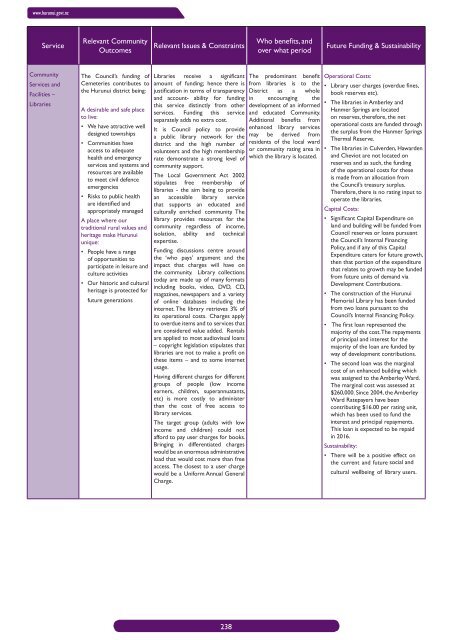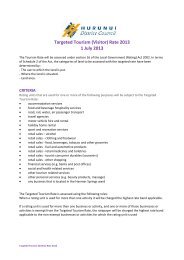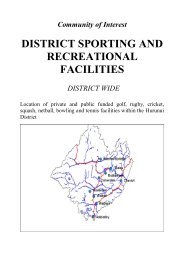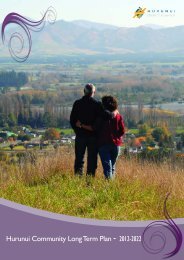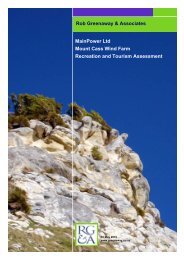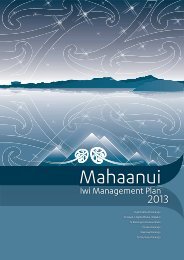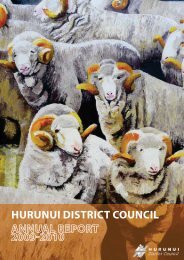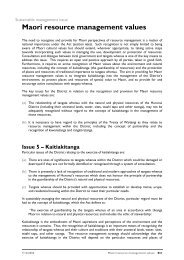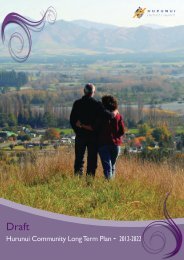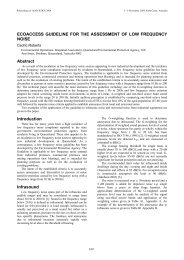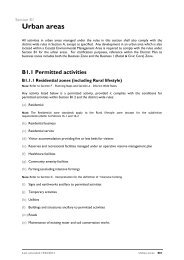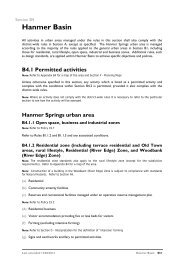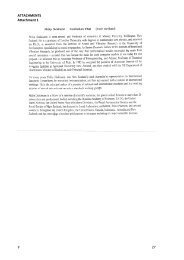Long Term Community Plan 2012-2022 - Hurunui District Council
Long Term Community Plan 2012-2022 - Hurunui District Council
Long Term Community Plan 2012-2022 - Hurunui District Council
Create successful ePaper yourself
Turn your PDF publications into a flip-book with our unique Google optimized e-Paper software.
www.hurunui.govt.nz<br />
Service<br />
Relevant <strong>Community</strong><br />
Outcomes<br />
Relevant Issues & Constraints<br />
Who benefits, and<br />
over what period<br />
Future Funding & Sustainability<br />
<strong>Community</strong><br />
Services and<br />
Facilities –<br />
Libraries<br />
The <strong>Council</strong>’s funding of<br />
Cemeteries contributes to<br />
the <strong>Hurunui</strong> district being:<br />
A desirable and safe place<br />
to live:<br />
• We have attractive well<br />
designed townships<br />
• Communities have<br />
access to adequate<br />
health and emergency<br />
services and systems and<br />
resources are available<br />
to meet civil defence<br />
emergencies<br />
• Risks to public health<br />
are identified and<br />
appropriately managed<br />
A place where our<br />
traditional rural values and<br />
heritage make <strong>Hurunui</strong><br />
unique:<br />
• People have a range<br />
of opportunities to<br />
participate in leisure and<br />
culture activities<br />
• Our historic and cultural<br />
heritage is protected for<br />
future generations<br />
Libraries receive a significant<br />
amount of funding; hence there is<br />
justification in terms of transparency<br />
and account- ability for funding<br />
this service distinctly from other<br />
services. Funding this service<br />
separately adds no extra cost.<br />
It is <strong>Council</strong> policy to provide<br />
a public library network for the<br />
district and the high number of<br />
volunteers and the high membership<br />
rate demonstrate a strong level of<br />
community support.<br />
The Local Government Act 2002<br />
stipulates free membership of<br />
libraries - the aim being to provide<br />
an accessible library service<br />
that supports an educated and<br />
culturally enriched community. The<br />
library provides resources for the<br />
community regardless of income,<br />
isolation, ability and technical<br />
expertise.<br />
Funding discussions centre around<br />
the ‘who pays’ argument and the<br />
impact that charges will have on<br />
the community. Library collections<br />
today are made up of many formats<br />
including books, video, DVD, CD,<br />
magazines, newspapers and a variety<br />
of online databases including the<br />
internet. The library retrieves 3% of<br />
its operational costs. Charges apply<br />
to overdue items and to services that<br />
are considered value added. Rentals<br />
are applied to most audiovisual loans<br />
– copyright legislation stipulates that<br />
libraries are not to make a profit on<br />
these items – and to some internet<br />
usage.<br />
Having different charges for different<br />
groups of people (low income<br />
earners, children, superannuatants,<br />
etc) is more costly to administer<br />
than the cost of free access to<br />
library services.<br />
The target group (adults with low<br />
income and children) could not<br />
afford to pay user charges for books.<br />
Bringing in differentiated charges<br />
would be an enormous administrative<br />
load that would cost more than free<br />
access. The closest to a user charge<br />
would be a Uniform Annual General<br />
Charge.<br />
The predominant benefit<br />
from libraries is to the<br />
<strong>District</strong> as a whole<br />
in encouraging the<br />
development of an informed<br />
and educated <strong>Community</strong>.<br />
Additional benefits from<br />
enhanced library services<br />
may be derived from<br />
residents of the local ward<br />
or community rating area in<br />
which the library is located.<br />
Operational Costs:<br />
• Library user charges (overdue fines,<br />
book reserves etc).<br />
• The libraries in Amberley and<br />
Hanmer Springs are located<br />
on reserves, therefore, the net<br />
operational costs are funded through<br />
the surplus from the Hanmer Springs<br />
Thermal Reserve.<br />
• The libraries in Culverden, Hawarden<br />
and Cheviot are not located on<br />
reserves and as such, the funding<br />
of the operational costs for these<br />
is made from an allocation from<br />
the <strong>Council</strong>’s treasury surplus.<br />
Therefore, there is no rating input to<br />
operate the libraries.<br />
Capital Costs:<br />
• Significant Capital Expenditure on<br />
land and building will be funded from<br />
<strong>Council</strong> reserves or loans pursuant<br />
the <strong>Council</strong>’s Internal Financing<br />
Policy, and if any of this Capital<br />
Expenditure caters for future growth,<br />
then that portion of the expenditure<br />
that relates to growth may be funded<br />
from future units of demand via<br />
Development Contributions.<br />
• The construction of the <strong>Hurunui</strong><br />
Memorial Library has been funded<br />
from two loans pursuant to the<br />
<strong>Council</strong>’s Internal Financing Policy.<br />
• The first loan represented the<br />
majority of the cost. The repayments<br />
of principal and interest for the<br />
majority of the loan are funded by<br />
way of development contributions.<br />
• The second loan was the marginal<br />
cost of an enhanced building which<br />
was assigned to the Amberley Ward.<br />
The marginal cost was assessed at<br />
$260,000. Since 2004, the Amberley<br />
Ward Ratepayers have been<br />
contributing $16.00 per rating unit,<br />
which has been used to fund the<br />
interest and principal repayments.<br />
This loan is expected to be repaid<br />
in 2016.<br />
Sustainability:<br />
• There will be a positive effect on<br />
the current and future social and<br />
cultural wellbeing of library users.<br />
238


